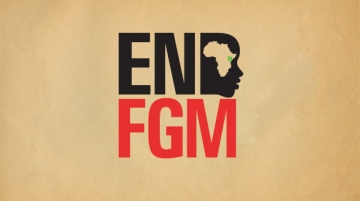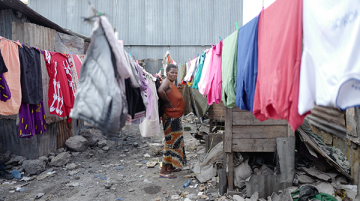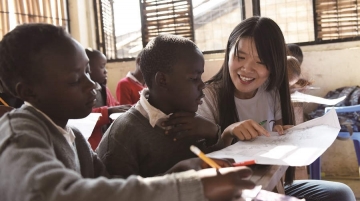
The following article was written by Bo Sun, a fellow at China House Kenya
My name is Bo Sun and I am a Chinese student studying abroad in Reno, Nevada. My father, however, lives and works in Tanzania. During my 2016 Christmas holiday, I visited the Tanzanian city of Dar es Salaam to spend the holidays with my family. A requirement of my school is the completion of community service hours, and I was therefore very pleased to meet a friend of my father’s called Robin. Robin works for the Tanzanian government and was able to introduce me to a local orphanage called Children’s’ Home. I decided to spend my time in Tanzania volunteering at Children’s Home.
 Children’s Home is an orphanage owned by the Catholic Church and run by the Catholic Sisters. The orphanage rescues abandoned children who are below the age of five. I worked with Children’s Home on a daily basis from 10am to 4pm. During this time I helped to feed and bathe the kids, as well as helped with their laundry. My winter break was not very long and so I only ended up spending a total of ten days helping at the orphanage.
Children’s Home is an orphanage owned by the Catholic Church and run by the Catholic Sisters. The orphanage rescues abandoned children who are below the age of five. I worked with Children’s Home on a daily basis from 10am to 4pm. During this time I helped to feed and bathe the kids, as well as helped with their laundry. My winter break was not very long and so I only ended up spending a total of ten days helping at the orphanage.
After spending these ten days at the Children’s Home, I was eager to do more for the children. My father encouraged me to start my own foundation, which I called Bo’s Love Children’s Home Foundation. The local Chinese community in Dar es Salaam met me with strong support for the foundation, both psychologically and financially. One of the donors, Mr. Qiang, told me that, “because we live and work here, we want to give back to the local community.”
A key component we introduced as part of the Bo’s Love Children’s Home Foundation was a new method through which we received donations. I had seen that previously when people wanted to donate money to the Children’s Home, they would simply leave cash at the foundation. I saw a way to improve this system by creating an account through which people could donate money. I built a website called boslovechf.com in order to be able to better track donation money. This website publishes the figures regarding what donation money has been received, as well as where it is being spent. In this way our donors are able to see exactly where their money is making a difference.

Children’s Home looks after the orphans until they reach the age of five and after this, the children are either adopted or sent to boarding school. Unfortunately, the lack of resources at Children’s Home means that they are unable to track the progress or provide additional support for the children after they leave. I became aware that many of the children who left the home as “adoptees” were not adopted by genuine families and rather, were being recruited into street gangs. In these street gangs, many of the children are forced to commit petty crimes such as pickpocketing as a means through which to survive.
I was very concerned about the children who were considered too old to stay at Children’s Home and, I wanted to construct a system through which they could be supported even after they left. In order to find out more about what I could do to help the children, I went to the city of Nairobi in neighboring Kenya. Kenya also struggles with the problem of poverty, one estimate stating that Nairobi has 250,000 homeless people, many of whom are children. In comparison to Tanzania however, Kenya has a better-developed system of non-governmental organizations working to combat issues of poverty and child abandonment. I therefore came to Kenya not to learn to, “give a man a fish to feed him for one day”, but rather to learn about, “teaching people to fish so they can feed themselves for a lifetime.” The focus of the Kenyan non-governmental organizations goes beyond simply providing children with food and rather aims to help children develop life skills as well as how to eventually be able to generate a living.

Imani Rehabilitation Center is a non-governmental organization that works to rescue abandoned infants and children. Imani also looks after children with special needs such as mental or physical disabilities. The Imani organization has multiple centers, each of which cater for the differing needs of the children. What I admire about Imani is that they look after the children until they are old enough to look after themselves. Additionally, Imani has a policy through which they continuously monitor the status of their children once they have left the home.
Raha Kids is another non-governmental organization based in Nairobi, Kenya. This organization rescues and rehabilitates street children. They provide the children with food, shelter as well as education. I was pleased to learn that Raha Kids, like the Imani Rehabilitation Center, monitors the children’s progress after they leave the home. I also agree with the Raha Kids policy that does not send the children away after they have turned five. Raha Kids believes that sending children as young as five away is futile because five-year-olds are not yet able to look after themselves. The Raha Kids organization inspired me to contact the Children’s Home in Tanzania to encourage them not to send away the children after they turn five. I additionally encouraged them to implement a tracking system in order to continuously monitor the children who have left the home.
There are many non-governmental organizations in Kenya that provide vocational training for impoverished people and I would like to mention a few: Heshima Kenya organization provides a program for women called Maisha. The Maisha program is a 12-month course that teaches women tailoring skills. Raregem Talent School provides children with special needs classes through which they are taught to create many kinds of handicrafts. Tunapanda organization aims to assist youths that are unable to afford university fees by providing courses on computer coding as well as art design. Youth Banner is another organization that teaches people entrepreneurial and business-related skills. All of these organizations provide underprivileged people with opportunities to learn valuable skills and thus, ensures a means through which people can empower themselves. Providing opportunities for people to learn skills also contributes to the improvement of the local community. These organizations have shown me that it is not enough to simply feed and clothe a person, there needs to be a system through which people are able to learn new skills and thus are able to empower themselves. Although the children at Children’s Home are too small to learn vocational skills such as tailoring, I have learned that it is very important to instill in the children the idea that they are capable of learning anything they desire and thus, have the ability to change their lives.

My aspiration for Bo’s Love Children’s Home Foundation is that the children will be able to go to vocational school once they have graduated from boarding school. In this way they can have the opportunity to positively influence not only their own lives but also the situation in their local communities.
Many Chinese people believe that donating money is all they can do to support those in need. I, however, have learned that this is not the case, and we can, in fact, do a lot more. Our efforts should go beyond simply contributing money, and rather should also aim to build a system through which people can lift themselves out of poverty. I learned a lot during my time spent in Tanzania and Kenya and I will work hard to implement these lessons into Bo’s Love Children’s Home Foundation.
This article was edited by Stephanie Farrand.




